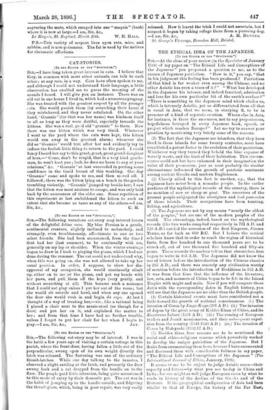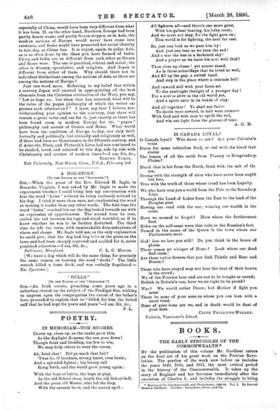THE ETHICAL IDEA OF THE JAPANESE.
[To THE EDITOR OF TRH " Stem:ma:1 SIR,—At the close of your review (in the Spectator of January 11th) of my paper on " The Ethical Life and Conceptions of the Japanese" you propound a question to me, as to the causes of Japanese patriotism. "How is it," you say, "that in his judgment this feeling has been produced P Patriotism of that kind is far weaker even among the Chinese, and no other Asiatic has even a trace of it ?" "What has developed in the Japanese his intense, and indeed fanatical, admiration and love for his own particular bit of the earth's surface P" "There is something in the Japanese mind which eludes us, which is intensely Asiatic, yet so differentiated from all that is usual in Asia, that we seem, in studying it, to be in presence of a kind of separate creation. Where else in Asia, for instance, is there the enormous, not to say preposterous, hopefulness betrayed in every Japanese book, speech, or project which reaches Europe ?" Let me try to answer your question by mentioning very briefly some of the reasons.
(1) The fact that the Japanese are islanders, that they have lived in these islands for some twenty centuries, must have constituted a potent factor in the evolution of their patriotism.
Whichever way they turned they beheld the blue expanse of waterly waste, and the limit of their habitation. This circum-
stance could not but have enhanced in their imagination the value of their possession, just as most probably the similar circumstance influenced the growth of patriotic sentiment among ancient Greeks and modern Englishmen.
(2) Closely allied to this fact is another, e.g., that the Japanese have never been a nomadic people. In the earlier portions of the mythological records of the country, there is no mention of cow or sheep or goat. The ancestors of the present people subjugated the aborigines and took possession of those islands. Their occupations have been hunting, fishing, and agriculture.
(3) The Japanese are not by any means "nearly the oldest of the peoples," but are one of the modern peoples of the
world. The chronology, indeed, based on the mythological records (the two works compiled respectively in 711 A.D. and 720 A.D.) carried the accession of the first Emperor, Jimmu Tenno, as far back as 660 B.C. But I believe the critical scholars know that in order to reach the region of historical facts, from five hundred to one thousand years are to be struck off, out of two thousand five hundred and fifty-six years. These records themselves tell us that chroniclers first began to write in 403 A.D. The Japanese did not know the use of letters before the introduction of the Chinese classics in 285 A.D., and there was scarcely any civilisation worthy of mention before the introduction of Buddhism in 352 A.D.
It was from that time that the influence of the literature, law, arts, and manners of China began to be felt in the Island Empire with might and main. Now if you will compare these dates with the corresponding dates in English history, you will see that the Japanese are no older than the British people.
(4) Certain historical events must have contributed not a little toward the growth of national consciousness. (i.) The
invasion of Corea by Jingo-Kogo (201 A.D.) (ii.) The invasion of Japan by the great army of Kublai-Khan of China, and its disastrous failure (1281 A.D.) (iii.) The coming of European traders and Jesuit missionaries, and their subsequent expul- sion from the country (1341-1640 AD.) (iv.) The invasion of Corea by Hideyoshi (1592-97 A.D.) (5) Besides these four reasons are to be mentioned the social and ethico-religious reasons which powerfully worked to develop the unique patriotism of the Japanese. But I desist from enumerating them here, because I have enumerated and discussed them with considerable fullness in my paper, "The Ethical Life and Conceptions of the Japanese" (The International Journal of Ethics, January, 1896).
It seems to me to be unjust to judge Asiatic races—their capacity and future—by what you see to-day in China and Iniia ; for one might as well judge European races by what he reads in histoly of the decline of the Gis eks and of the Romans. If the geographical configuration of Asia had been similar to that of Europe, the history of the Far Emit,
especially of China, would have been very different from what it has been. If, on the other hand, Northern Europe had been partly desert waste, and partly frozen steppes, as in Asia, the modern nations of Europe would never have come into existence, and Rome might have preserved her social identity to this day. as China has. It is unjust, again, to judge Asia, as is so often done, by the ideas you have formed of India. China and India are as different from each other as Greece and Rome were. The one is practical, ethical, and social ; the other is dreamy, speculative, and religious. And Japan is different from either of them. Why should there not be individual distinctions among the nations of Asia as there are among the nations of Europe ?
Just one word more. Referring to my belief that within a century Japan will succeed in appropriating all the best elements from the Christian civilisation of the West, you say, us hope so; but when that has occurred, what will be the value of the pagan philosophy of which the writer ex- presses such admiration P" I must say that I believe, not- withstanding your opinion to the contrary, that there will remain a great value and use for it, just exactly as there has been found room in modern Europe for the " pagan " philosophy and morals of Greece and Rome. What would have been the condition of Europe to.day, not only intel- lectually and politically, but ethically and religiously as well, if there had been no Renaissance in the fifteenth century, and if Aristotle, Plato, and Plutarch's Lives had not continued to be studied, loved, and admired to this day, side by side with Christianity and science of modern times P—I am, Sir, Sec., Toxiwo Yosor.
Yale University, New Haven, Conn., USA, February 3rd.







































 Previous page
Previous page